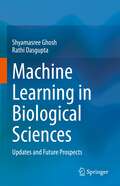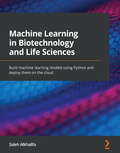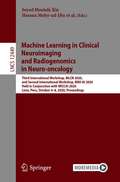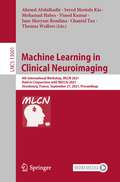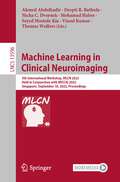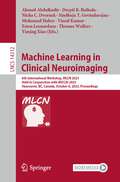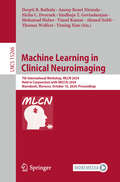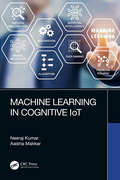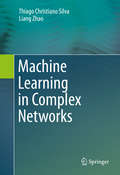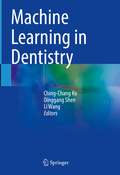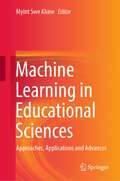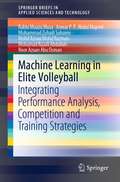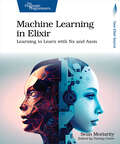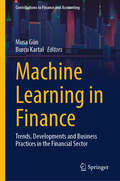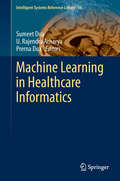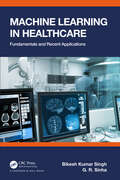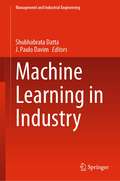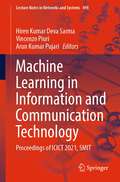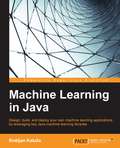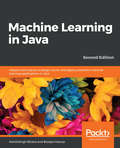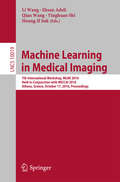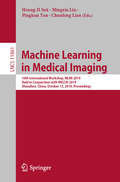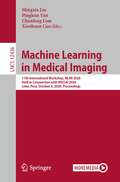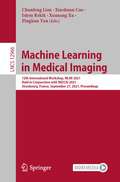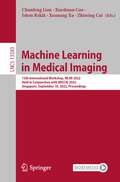- Table View
- List View
Machine Learning in Biological Sciences: Updates and Future Prospects
by Shyamasree Ghosh Rathi DasguptaThis book gives an overview of applications of Machine Learning (ML) in diverse fields of biological sciences, including healthcare, animal sciences, agriculture, and plant sciences. Machine learning has major applications in process modelling, computer vision, signal processing, speech recognition, and language understanding and processing and life, and health sciences. It is increasingly used in understanding DNA patterns and in precision medicine. This book is divided into eight major sections, each containing chapters that describe the application of ML in a certain field. The book begins by giving an introduction to ML and the various ML methods. It then covers interesting and timely aspects such as applications in genetics, cell biology, the study of plant-pathogen interactions, and animal behavior. The book discusses computational methods for toxicity prediction of environmental chemicals and drugs, which forms a major domain of research in the field of biology. It is of relevance to post-graduate students and researchers interested in exploring the interdisciplinary areas of use of machine learning and deep learning in life sciences.
Machine Learning in Biotechnology and Life Sciences: Build machine learning models using Python and deploy them on the cloud
by Saleh AlkhalifaExplore all the tools and templates needed for data scientists to drive success in their biotechnology careers with this comprehensive guideKey FeaturesLearn the applications of machine learning in biotechnology and life science sectorsDiscover exciting real-world applications of deep learning and natural language processingUnderstand the general process of deploying models to cloud platforms such as AWS and GCPBook DescriptionThe booming fields of biotechnology and life sciences have seen drastic changes over the last few years. With competition growing in every corner, companies around the globe are looking to data-driven methods such as machine learning to optimize processes and reduce costs. This book helps lab scientists, engineers, and managers to develop a data scientist's mindset by taking a hands-on approach to learning about the applications of machine learning to increase productivity and efficiency in no time.You'll start with a crash course in Python, SQL, and data science to develop and tune sophisticated models from scratch to automate processes and make predictions in the biotechnology and life sciences domain. As you advance, the book covers a number of advanced techniques in machine learning, deep learning, and natural language processing using real-world data.By the end of this machine learning book, you'll be able to build and deploy your own machine learning models to automate processes and make predictions using AWS and GCP.What you will learnGet started with Python programming and Structured Query Language (SQL)Develop a machine learning predictive model from scratch using PythonFine-tune deep learning models to optimize their performance for various tasksFind out how to deploy, evaluate, and monitor a model in the cloudUnderstand how to apply advanced techniques to real-world dataDiscover how to use key deep learning methods such as LSTMs and transformersWho this book is forThis book is for data scientists and scientific professionals looking to transcend to the biotechnology domain. Scientific professionals who are already established within the pharmaceutical and biotechnology sectors will find this book useful. A basic understanding of Python programming and beginner-level background in data science conjunction is needed to get the most out of this book.
Machine Learning in Clinical Neuroimaging and Radiogenomics in Neuro-oncology: Third International Workshop, MLCN 2020, and Second International Workshop, RNO-AI 2020, Held in Conjunction with MICCAI 2020, Lima, Peru, October 4–8, 2020, Proceedings (Lecture Notes in Computer Science #12449)
by Hongzhi Wang Seyed Mostafa Kia Mohamad Habes Hassan Mohy-ud-Din Saima Rathore Ahmed Abdulkadir Cher Bass Jane Maryam Rondina Chantal Tax Thomas Wolfers Madhura IngalhalikarThis book constitutes the refereed proceedings of the Third International Workshop on Machine Learning in Clinical Neuroimaging, MLCN 2020, and the Second International Workshop on Radiogenomics in Neuro-oncology, RNO-AI 2020, held in conjunction with MICCAI 2020, in Lima, Peru, in October 2020.*For MLCN 2020, 18 papers out of 28 submissions were accepted for publication. The accepted papers present novel contributions in both developing new machine learning methods and applications of existing methods to solve challenging problems in clinical neuroimaging. For RNO-AI 2020, all 8 submissions were accepted for publication. They focus on addressing the problems of applying machine learning to large and multi-site clinical neuroimaging datasets. The workshop aimed to bring together experts in both machine learning and clinical neuroimaging to discuss and hopefully bridge the existing challenges of applied machine learning in clinical neuroscience. *The workshops were held virtually due to the COVID-19 pandemic.
Machine Learning in Clinical Neuroimaging: 4th International Workshop, MLCN 2021, Held in Conjunction with MICCAI 2021, Strasbourg, France, September 27, 2021, Proceedings (Lecture Notes in Computer Science #13001)
by Vinod Kumar Seyed Mostafa Kia Mohamad Habes Ahmed Abdulkadir Jane Maryam Rondina Chantal Tax Thomas WolfersThis book constitutes the refereed proceedings of the 4th International Workshop on Machine Learning in Clinical Neuroimaging, MLCN 2021, held on September 27, 2021, in conjunction with MICCAI 2021. The workshop was held virtually due to the COVID-19 pandemic. The 17 papers presented in this book were carefully reviewed and selected from 27 submissions. They were organized in topical sections named: computational anatomy and brain networks and time series.
Machine Learning in Clinical Neuroimaging: 5th International Workshop, MLCN 2022, Held in Conjunction with MICCAI 2022, Singapore, September 18, 2022, Proceedings (Lecture Notes in Computer Science #13596)
by Vinod Kumar Seyed Mostafa Kia Mohamad Habes Ahmed Abdulkadir Thomas Wolfers Deepti R. Bathula Nicha C. DvornekThis book constitutes the refereed proceedings of the 5th International Workshop on Machine Learning in Clinical Neuroimaging, MLCN 2022, held in Conjunction with MICCAI 2022, Singapore in September 2022. The book includes 17 papers which were carefully reviewed and selected from 23 full-length submissions.The 5th international workshop on Machine Learning in Clinical Neuroimaging (MLCN2022) aims to bring together the top researchers in both machine learning and clinical neuroscience as well as tech-savvy clinicians to address two main challenges: 1) development of methodological approaches for analyzing complex and heterogeneous neuroimaging data (machine learning track); and 2) filling the translational gap in applying existing machine learning methods in clinical practices (clinical neuroimaging track).The papers are categorzied into topical sub-headings: Morphometry; Diagnostics, and Aging, and Neurodegeneration.
Machine Learning in Clinical Neuroimaging: 6th International Workshop, MLCN 2023, Held in Conjunction with MICCAI 2023, Vancouver, BC, Canada, October 8, 2023, Proceedings (Lecture Notes in Computer Science #14312)
by Vinod Kumar Yiming Xiao Mohamad Habes Ahmed Abdulkadir Thomas Wolfers Deepti R. Bathula Nicha C. Dvornek Sindhuja T. Govindarajan Esten LeonardsenThis book constitutes the refereed proceedings of the 6th International Workshop on Machine Learning in Clinical Neuroimaging, MLCN 2023, held in Conjunction with MICCAI 2023 in Vancouver, Canada, in October 2023. The book includes 16 papers which were carefully reviewed and selected from 28 full-length submissions.The 6th International Workshop on Machine Learning in Clinical Neuroimaging (MLCN 2023) aims to bring together the top researchers in both machine learning and clinical neuroscience as well as tech-savvy clinicians to address two main challenges: 1) development of methodological approaches for analyzing complex and heterogeneous neuroimaging data (machine learning track); and 2) filling the translational gap in applying existing machine learning methods in clinical practices (clinical neuroimaging track).The papers are categorzied into topical sub-headings on Machine Learning and Clinical Applications.
Machine Learning in Clinical Neuroimaging: 7th International Workshop, MLCN 2024, Held in Conjunction with MICCAI 2024, Marrakesh, Morocco, October 10, 2024, Proceedings (Lecture Notes in Computer Science #15266)
by Vinod Kumar Yiming Xiao Mohamad Habes Thomas Wolfers Deepti R. Bathula Nicha C. Dvornek Sindhuja T. Govindarajan Anoop Benet Nirmala Ahmed NebliThis book constitutes the refereed proceedings of the 7th International Workshop on Machine Learning in Clinical Neuroimaging, MLCN 2024, held in Conjunction with MICCAI 2024 in Marrakesh, Morocco, on 10th October 2024. The 16 full papers presented in this volume were carefully reviewed and selected from 28 submissions. They are grouped into the following topics: machine learning; clinical applications.
Machine Learning in Cognitive IoT
by Neeraj Kumar Aaisha MakkarThis book covers the different technologies of Internet, and machine learning capabilities involved in Cognitive Internet of Things (CIoT). Machine learning is explored by covering all the technical issues and various models used for data analytics during decision making at different steps. It initiates with IoT basics, its history, architecture and applications followed by capabilities of CIoT in real world and description of machine learning (ML) in data mining. Further, it explains various ML techniques and paradigms with different phases of data pre-processing and feature engineering. Each chapter includes sample questions to help understand concepts of ML used in different applications. Explains integration of Machine Learning in IoT for building an efficient decision support system Covers IoT, CIoT, machine learning paradigms and models Includes implementation of machine learning models in R Help the analysts and developers to work efficiently with emerging technologies such as data analytics, data processing, Big Data, Robotics Includes programming codes in Python/Matlab/R alongwith practical examples, questions and multiple choice questions
Machine Learning in Complex Networks
by Liang Zhao Thiago Christiano SilvaThis book presents the features and advantages offered by complex networks in the machine learning domain. In the first part, an overview on complex networks and network-based machine learning is presented, offering necessary background material. In the second part, we describe in details some specific techniques based on complex networks for supervised, non-supervised, and semi-supervised learning. Particularly, a stochastic particle competition technique for both non-supervised and semi-supervised learning using a stochastic nonlinear dynamical system is described in details. Moreover, an analytical analysis is supplied, which enables one to predict the behavior of the proposed technique. In addition, data reliability issues are explored in semi-supervised learning. Such matter has practical importance and is not often found in the literature. With the goal of validating these techniques for solving real problems, simulations on broadly accepted databases are conducted. Still in this book, we present a hybrid supervised classification technique that combines both low and high orders of learning. The low level term can be implemented by any classification technique, while the high level term is realized by the extraction of features of the underlying network constructed from the input data. Thus, the former classifies the test instances by their physical features, while the latter measures the compliance of the test instances with the pattern formation of the data. We show that the high level technique can realize classification according to the semantic meaning of the data. This book intends to combine two widely studied research areas, machine learning and complex networks, which in turn will generate broad interests to scientific community, mainly to computer science and engineering areas.
Machine Learning in Dentistry
by Li Wang Dinggang Shen Ching-Chang KoThis book reviews all aspects of the use of machine learning in contemporary dentistry, clearly explaining its significance for dental imaging, oral diagnosis and treatment, dental designs, and dental research. Machine learning is an emerging field of artificial intelligence research and practice in which computer agents are employed to improve perception, cognition, and action based on their ability to “learn”, for example through use of big data techniques. Its application within dentistry is designed to promote personalized and precision patient care, with enhancement of diagnosis and treatment planning. In this book, readers will find up-to-date information on different machine learning tools and their applicability in various dental specialties. The selected examples amply illustrate the opportunities to employ a machine learning approach within dentistry while also serving to highlight the associated challenges. Machine Learning in Dentistry will be of value for all dental practitioners and researchers who wish to learn more about the potential benefits of using machine learning techniques in their work.
Machine Learning in Educational Sciences: Approaches, Applications and Advances
by Myint Swe KhineThis comprehensive volume investigates the untapped potential of machine learning in educational settings. It examines the profound impact machine learning can have on reshaping educational research. Each chapter delves into specific applications and advancements, sheds light on theory-building, and multidisciplinary research, and identifies areas for further development. It encompasses various topics, such as machine-based learning in psychological assessment. It also highlights the power of machine learning in analyzing large-scale international assessment data and utilizing natural language processing for science education. With contributions from leading scholars in the field, this book provides a comprehensive, evidence-based framework for leveraging machine-learning approaches to enhance educational outcomes. The book offers valuable insights and recommendations that could help shape the future of educational sciences.
Machine Learning in Elite Volleyball: Integrating Performance Analysis, Competition and Training Strategies (SpringerBriefs in Applied Sciences and Technology)
by Mohamad Razali Abdullah Mohd Azraai Mohd Razman Rabiu Muazu Musa Anwar P. Abdul Majeed Muhammad Zuhaili Suhaimi Noor Azuan Abu OsmanThis brief highlights the use of various Machine Learning (ML) algorithms to evaluate training and competitional strategies in Volleyball, as well as to identify high-performance players in the sport. Several psychological elements/strategies coupled with human performance parameters are discussed in view to ascertain their impact on performance in elite Volleyball competitions. It presents key performance indicators as well as human performance parameters that can be used in future evaluation of team performance and players. The details outlined in this brief are vital to coaches, club managers, talent identification experts, performance analysts as well as other important stakeholders in the evaluation of performance and to foster improvement in this sport.
Machine Learning in Elixir
by Sean MoriarityStable Diffusion, ChatGPT, Whisper - these are just a few examples of incredible applications powered by developments in machine learning. Despite the ubiquity of machine learning applications running in production, there are only a few viable language choices for data science and machine learning tasks. Elixir's Nx project seeks to change that. With Nx, you can leverage the power of machine learning in your applications, using the battle-tested Erlang VM in a pragmatic language like Elixir. In this book, you'll learn how to leverage Elixir and the Nx ecosystem to solve real-world problems in computer vision, natural language processing, and more. The Elixir Nx project aims to make machine learning possible without the need to leave Elixir for solutions in other languages. And even if concepts like linear models and logistic regression are new to you, you'll be using them and much more to solve real-world problems in no time. Start with the basics of the Nx programming paradigm - how it differs from the Elixir programming style you're used to and how it enables you to write machine learning algorithms. Use your understanding of this paradigm to implement foundational machine learning algorithms from scratch. Go deeper and discover the power of deep learning with Axon. Unlock the power of Elixir and learn how to build and deploy machine learning models and pipelines anywhere. Learn how to analyze, visualize, and explain your data and models. Discover how to use machine learning to solve diverse problems from image recognition to content recommendation - all in your favorite programming language. What You Need: You'll need a computer with a working installation of Elixir v1.12 and Erlang/OTP 24. For some of the more compute intensive examples, you'll want to use EXLA, which currently only supports x86-64 platforms. While not explicitly required, some examples will demonstrate programs running on accelerators such as CUDA/ROCm enabled GPUs and Google TPUs. Most of these programs will still run fine on a regular CPU, just for much longer periods of time.
Machine Learning in Finance: Trends, Developments and Business Practices in the Financial Sector (Contributions to Finance and Accounting)
by Musa Gün Burcu KartalThis book discusses the evolution of technical features in decentralized finance and focuses on machine-learning finance in emerging economies. As technological advancement evolves at an unpredictable pace, the financial industry, like every other sector, must adapt accordingly. Furthermore, the rapid expansion of diverse financial products and services is creating new applications and markets. Alongside technological progress, the exploration of complex patterns in vast amounts of data, known as big data, is facilitated by its commonly acknowledged characteristics: volume, variety, veracity, value, and velocity. Overall, machine learning has become crucial in the financial industry, allowing businesses to automate operations, gain insights from data, and make more informed decisions in real time. This edited book covers algorithmic trading, risk management, fraud detection, customer service and personalization, portfolio management, credit scoring, sentiment analysis, and algorithmic pricing. The book connects theoretical concepts with practical real-world applications, benefiting professionals looking to enhance their proficiency in using these methods efficiently. It offers insightful guidance for theorists, market participants, and policymakers by exploring financial theories and practices in light of contemporary machine-learning approaches, with a special emphasis on emerging economies.
Machine Learning in Healthcare Informatics
by Sumeet Dua U. Rajendra Acharya Prerna DuaThe book is a unique effort to represent a variety of techniques designed to represent, enhance, and empower multi-disciplinary and multi-institutional machine learning research in healthcare informatics. The book provides a unique compendium of current and emerging machine learning paradigms for healthcare informatics and reflects the diversity, complexity and the depth and breath of this multi-disciplinary area. The integrated, panoramic view of data and machine learning techniques can provide an opportunity for novel clinical insights and discoveries.
Machine Learning in Healthcare: Fundamentals and Recent Applications
by G.R. Sinha Bikesh Kumar SinghArtificial intelligence (AI) and machine learning (ML) techniques play an important role in our daily lives by enhancing predictions and decision-making for the public in several fields such as financial services, real estate business, consumer goods, social media, etc. Despite several studies that have proved the efficacy of AI/ML tools in providing improved healthcare solutions, it has not gained the trust of health-care practitioners and medical scientists. This is due to poor reporting of the technology, variability in medical data, small datasets, and lack of standard guidelines for application of AI. Therefore, the development of new AI/ML tools for various domains of medicine is an ongoing field of research. Machine Learning in Healthcare: Fundamentals and Recent Applications discusses how to build various ML algorithms and how they can be applied to improve healthcare systems. Healthcare applications of AI are innumerable: medical data analysis, early detection and diagnosis of disease, providing objective-based evidence to reduce human errors, curtailing inter- and intra-observer errors, risk identification and interventions for healthcare management, real-time health monitoring, assisting clinicians and patients for selecting appropriate medications, and evaluating drug responses. Extensive demonstrations and discussion on the various principles of machine learning and its application in healthcare is provided, along with solved examples and exercises. This text is ideal for readers interested in machine learning without any background knowledge and looking to implement machine-learning models for healthcare systems.
Machine Learning in Industry (Management and Industrial Engineering)
by J. Paulo Davim Shubhabrata DattaThis book covers different machine learning techniques such as artificial neural network, support vector machine, rough set theory and deep learning. It points out the difference between the techniques and their suitability for specific applications. This book also describes different applications of machine learning techniques for industrial problems. The book includes several case studies, helping researchers in academia and industries aspiring to use machine learning for solving practical industrial problems.
Machine Learning in Information and Communication Technology: Proceedings of ICICT 2021, SMIT (Lecture Notes in Networks and Systems #498)
by Vincenzo Piuri Hiren Kumar Deva Sarma Arun Kumar PujariThis book presents collection of research papers presented at International Conference on Information and Communication Technology (ICICT 2021) organized by Department of Information Technology, Sikkim Manipal Institute of Technology, Sikkim, India, during 23–24 December 2021. The book includes papers in the research area of communication networks, data science, healthcare informatics, bio-medical image processing, security of information including cryptography, machine learning applications, and AI applications.
Machine Learning in Java
by Bostjan KaluzaDesign, build, and deploy your own machine learning applications by leveraging key Java machine learning libraries About This Book * Develop a sound strategy to solve predictive modelling problems using the most popular machine learning Java libraries * Explore a broad variety of data processing, machine learning, and natural language processing through diagrams, source code, and real-world applications * Packed with practical advice and tips to help you get to grips with applied machine learning Who This Book Is For If you want to learn how to use Java's machine learning libraries to gain insight from your data, this book is for you. It will get you up and running quickly and provide you with the skills you need to successfully create, customize, and deploy machine learning applications in real life. You should be familiar with Java programming and data mining concepts to make the most of this book, but no prior experience with data mining packages is necessary. What You Will Learn * Understand the basic steps of applied machine learning and how to differentiate among various machine learning approaches * Discover key Java machine learning libraries, what each library brings to the table, and what kind of problems each are able to solve * Learn how to implement classification, regression, and clustering * Develop a sustainable strategy for customer retention by predicting likely churn candidates * Build a scalable recommendation engine with Apache Mahout * Apply machine learning to fraud, anomaly, and outlier detection * Experiment with deep learning concepts, algorithms, and the toolbox for deep learning * Write your own activity recognition model for eHealth applications using mobile sensors In Detail As the amount of data continues to grow at an almost incomprehensible rate, being able to understand and process data is becoming a key differentiator for competitive organizations. Machine learning applications are everywhere, from self-driving cars, spam detection, document search, and trading strategies, to speech recognition. This makes machine learning well-suited to the present-day era of Big Data and Data Science. The main challenge is how to transform data into actionable knowledge. Machine Learning in Java will provide you with the techniques and tools you need to quickly gain insight from complex data. You will start by learning how to apply machine learning methods to a variety of common tasks including classification, prediction, forecasting, market basket analysis, and clustering. Moving on, you will discover how to detect anomalies and fraud, and ways to perform activity recognition, image recognition, and text analysis. By the end of the book, you will explore related web resources and technologies that will help you take your learning to the next level. By applying the most effective machine learning methods to real-world problems, you will gain hands-on experience that will transform the way you think about data. Style and approach This is a practical tutorial that uses hands-on examples to step through some real-world applications of machine learning. Without shying away from the technical details, you will explore machine learning with Java libraries using clear and practical examples. You will explore how to prepare data for analysis, choose a machine learning method, and measure the success of the process.
Machine Learning in Java: Helpful techniques to design, build, and deploy powerful machine learning applications in Java, 2nd Edition
by Bostjan Kaluza AshishSingh BhatiaLeverage the power of Java and its associated machine learning libraries to build powerful predictive models Key Features *Solve predictive modeling problems using the most popular machine learning Java libraries *Explore data processing, machine learning, and NLP concepts using JavaML, WEKA, MALLET libraries *Practical examples, tips, and tricks to help you understand applied machine learning in Java Book Description As the amount of data in the world continues to grow at an almost incomprehensible rate, being able to understand and process data is becoming a key differentiator for competitive organizations. Machine learning applications are everywhere, from self-driving cars, spam detection, document search, and trading strategies, to speech recognition. This makes machine learning well-suited to the present-day era of big data and Data Science. The main challenge is how to transform data into actionable knowledge. Machine Learning in Java will provide you with the techniques and tools you need. You will start by learning how to apply machine learning methods to a variety of common tasks including classification, prediction, forecasting, market basket analysis, and clustering. The code in this book works for JDK 8 and above, the code is tested on JDK 11. Moving on, you will discover how to detect anomalies and fraud, and ways to perform activity recognition, image recognition, and text analysis. By the end of the book, you will have explored related web resources and technologies that will help you take your learning to the next level. By applying the most effective machine learning methods to real-world problems, you will gain hands-on experience that will transform the way you think about data. What you will learn *Discover key Java machine learning libraries *Implement concepts such as classification, regression, and clustering *Develop a customer retention strategy by predicting likely churn candidates *Build a scalable recommendation engine with Apache Mahout *Apply machine learning to fraud, anomaly, and outlier detection *Experiment with deep learning concepts and algorithms *Write your own activity recognition model for eHealth applications Who this book is for If you want to learn how to use Java's machine learning libraries to gain insight from your data, this book is for you. It will get you up and running quickly and provide you with the skills you need to successfully create, customize, and deploy machine learning applications with ease. You should be familiar with Java programming and some basic data mining concepts to make the most of this book, but no prior experience with machine learning is required.
Machine Learning in Medical Imaging
by Qian Wang Li Wang Ehsan Adeli Yinghuan Shi Heung-Il SukThis book constitutes the refereed proceedings of the 7th International Workshop on Machine Learning in Medical Imaging, MLMI 2016, held in conjunction with MICCAI 2016, in Athens, Greece, in October 2016. The 38 full papers presented in this volume were carefully reviewed and selected from 60 submissions. The main aim of this workshop is to help advance scientific research within the broad field of machine learning in medical imaging. The workshop focuses on major trends and challenges in this area, and presents works aimed to identify new cutting-edge techniques and their use in medical imaging.
Machine Learning in Medical Imaging: 10th International Workshop, MLMI 2019, Held in Conjunction with MICCAI 2019, Shenzhen, China, October 13, 2019, Proceedings (Lecture Notes in Computer Science #11861)
by Heung-Il Suk Mingxia Liu Pingkun Yan Chunfeng LianThis book constitutes the proceedings of the 10th International Workshop on Machine Learning in Medical Imaging, MLMI 2019, held in conjunction with MICCAI 2019, in Shenzhen, China, in October 2019. The 78 papers presented in this volume were carefully reviewed and selected from 158 submissions. They focus on major trends and challenges in the area, aiming to identify new-cutting-edge techniques and their uses in medical imaging. Topics dealt with are: deep learning, generative adversarial learning, ensemble learning, sparse learning, multi-task learning, multi-view learning, manifold learning, and reinforcement learning, with their applications to medical image analysis, computer-aided detection and diagnosis, multi-modality fusion, image reconstruction, image retrieval, cellular image analysis, molecular imaging, digital pathology, etc.
Machine Learning in Medical Imaging: 11th International Workshop, MLMI 2020, Held in Conjunction with MICCAI 2020, Lima, Peru, October 4, 2020, Proceedings (Lecture Notes in Computer Science #12436)
by Mingxia Liu Pingkun Yan Chunfeng Lian Xiaohuan CaoThis book constitutes the proceedings of the 11th International Workshop on Machine Learning in Medical Imaging, MLMI 2020, held in conjunction with MICCAI 2020, in Lima, Peru, in October 2020. The conference was held virtually due to the COVID-19 pandemic. The 68 papers presented in this volume were carefully reviewed and selected from 101 submissions. They focus on major trends and challenges in the above-mentioned area, aiming to identify new-cutting-edge techniques and their uses in medical imaging. Topics dealt with are: deep learning, generative adversarial learning, ensemble learning, sparse learning, multi-task learning, multi-view learning, manifold learning, and reinforcement learning, with their applications to medical image analysis, computer-aided detection and diagnosis, multi-modality fusion, image reconstruction, image retrieval, cellular image analysis, molecular imaging, digital pathology, etc.
Machine Learning in Medical Imaging: 12th International Workshop, MLMI 2021, Held in Conjunction with MICCAI 2021, Strasbourg, France, September 27, 2021, Proceedings (Lecture Notes in Computer Science #12966)
by Islem Rekik Pingkun Yan Chunfeng Lian Xiaohuan Cao Xuanang XuThis book constitutes the proceedings of the 12th International Workshop on Machine Learning in Medical Imaging, MLMI 2021, held in conjunction with MICCAI 2021, in Strasbourg, France, in September 2021.*The 71 papers presented in this volume were carefully reviewed and selected from 92 submissions. They focus on major trends and challenges in the above-mentioned area, aiming to identify new-cutting-edge techniques and their uses in medical imaging. Topics dealt with are: deep learning, generative adversarial learning, ensemble learning, sparse learning, multi-task learning, multi-view learning, manifold learning, and reinforcement learning, with their applications to medical image analysis, computer-aided detection and diagnosis, multi-modality fusion, image reconstruction, image retrieval, cellular image analysis, molecular imaging, digital pathology, etc. *The workshop was held virtually.
Machine Learning in Medical Imaging: 13th International Workshop, MLMI 2022, Held in Conjunction with MICCAI 2022, Singapore, September 18, 2022, Proceedings (Lecture Notes in Computer Science #13583)
by Islem Rekik Chunfeng Lian Xiaohuan Cao Xuanang Xu Zhiming CuiThis book constitutes the proceedings of the 13th International Workshop on Machine Learning in Medical Imaging, MLMI 2022, held in conjunction with MICCAI 2022, in Singapore, in September 2022. The 48 full papers presented in this volume were carefully reviewed and selected from 64 submissions. They focus on major trends and challenges in the above-mentioned area, aiming to identify new-cutting-edge techniques and their uses in medical imaging. Topics dealt with are: deep learning, generative adversarial learning, ensemble learning, sparse learning, multi-task learning, multi-view learning, manifold learning, and reinforcement learning, with their applications to medical image analysis, computer-aided detection and diagnosis, multi-modality fusion, image reconstruction, image retrieval, cellular image analysis, molecular imaging, digital pathology, etc.
